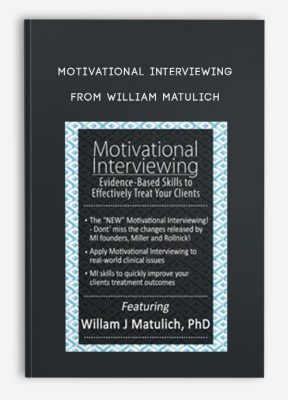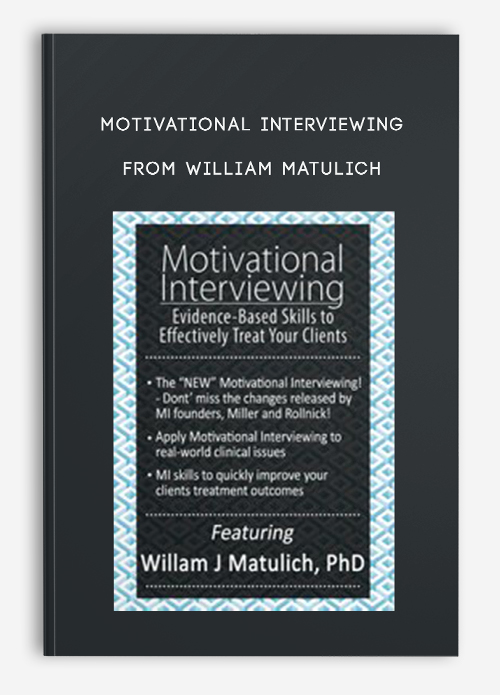Motivational Interviewing from William Matulich
$109.00 $32.00

Motivational Interviewing Eliciting Clients’ Own Arguments for Change from William Matulich
Faculty:William Matulich
Duration:6 Hours 13 Minutes | Format:Audio and Video
Archive : Motivational Interviewing from William Matulich
Get Motivational Interviewing from William Matulich on Salaedu.com

Outline:
Learning MI
- The mindset and methods
- How is MI different?
- Learning to listen
- Recognize “change talk”
- Elicit change talk
What is MI?
- A conversation
- Person-centered
- Addresses ambivalence
- Goal-oriented
- Evokes intrinsic motivation
- Honors autonomy
- Evidence-based
Theories of Motivation
- Myths
- Stages of Change
- Expectancy Theory
- Needs Theory
- Reactance Theory
- Self-Perception Theory
- Self-Determination Theory
What really motivates us?
- Extrinsic Motivation
- Intrinsic Motivation
- Styles of Helping Communication
- Guiding
- Directing
- Following
Assessing Motivation
- Scaling questions
The “Spirit” of MI
- Partnership/Collaboration
- Evocation
- Acceptance/Autonomy
- Compassion
The Processes of MI
- Engaging
- Focusing
- Evoking
- Planning
How do we do it? The OARS
- Open-ended questions
- Affirmations
- Reflections
- Summaries
Change Talk
- DARN-CAT
- Respond to Change Talk
- Elicit Change Talk
Resistance or Discord?
- Seven ways to handle resistant clients
What to avoid
- The Righting Reflex
- Question-answer trap
- Confrontation
- Labeling
- Premature focus
- Blaming
- Expert
- Gordon’s roadblocks
Planning
- Gain commitment
- Change Plan
Get Motivational Interviewing from William Matulich on Salaedu.com
Description:
- Don’t miss the recent Motivational Interviewing updates and changes!
- Evidence-based strategies to elicit change talk
- Effective interventions and strategies for six stages of change
- Six key elements of effective feedback enhancing client motivation
- Eight approaches to motivation
Motivational Interviewing (MI) is a client-centered, goal-directed counseling style developed by Drs. William R. Miller and Stephen Rollnick to help people change behavior. MI involves learning to use simple but powerful techniques that help to quickly establish a productive, working relationship with clients, allowing them to explore their own motivation, ambivalence, and resistance to change and to efficiently guide them toward more desirable behavior. The effectiveness of MI has been demonstrated in a variety of settings with many different types of clients in several different countries.
1 review for Motivational Interviewing from William Matulich
Add a review Cancel reply
Related products
HEALTH - FITNESS - LIFESTYLE - MEDICAL
HEALTH - FITNESS - LIFESTYLE - MEDICAL
HEALTH - FITNESS - LIFESTYLE - MEDICAL
HEALTH - FITNESS - LIFESTYLE - MEDICAL
HEALTH - FITNESS - LIFESTYLE - MEDICAL
Fitness Mentors – Audio Lectures, Practice Tests and Study Guide for the NASM CPT Ex
HEALTH - FITNESS - LIFESTYLE - MEDICAL
HEALTH - FITNESS - LIFESTYLE - MEDICAL










king –
“I learned a great deal from this presenter today about Motivational Interviewing. He was very knowledgeable and organized and used effective teaching strategies throughout the course! This is definitely a course that has been beneficial to me. :)”